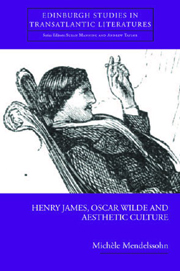Book contents
- Frontmatter
- Contents
- Acknowledgements
- List of Abbreviations
- List of Figures
- Dedication
- Introduction
- 1 ‘I Have Asked Henry James Not to Bring his Friend Oscar Wilde’: Daisy Miller, Washington Square and The Politics of Transatlantic Aestheticism
- 2 The Gentle Art of Making Enemies and of Remaking Aestheticism
- 3 The School of the Future as well as the Present: Wilde's Impressions of James in Intentions and The Picture of Dorian Gray
- 4 ‘Wild Thoughts and Desire! Things I Can't Tell You – Words I Can't Speak!’: The Drama of Identity in The Importance of Being Earnest and Guy Domville
- 5 Despoiling Poynton: James, the Wilde Trials and Interior Decoration
- 6 ‘A Nest of Almost Infant Blackmailers’: The End of Innocence in The Turn of the Screw and De Profundis
- Bibliography
- Index
6 - ‘A Nest of Almost Infant Blackmailers’: The End of Innocence in The Turn of the Screw and De Profundis
Published online by Cambridge University Press: 12 September 2012
- Frontmatter
- Contents
- Acknowledgements
- List of Abbreviations
- List of Figures
- Dedication
- Introduction
- 1 ‘I Have Asked Henry James Not to Bring his Friend Oscar Wilde’: Daisy Miller, Washington Square and The Politics of Transatlantic Aestheticism
- 2 The Gentle Art of Making Enemies and of Remaking Aestheticism
- 3 The School of the Future as well as the Present: Wilde's Impressions of James in Intentions and The Picture of Dorian Gray
- 4 ‘Wild Thoughts and Desire! Things I Can't Tell You – Words I Can't Speak!’: The Drama of Identity in The Importance of Being Earnest and Guy Domville
- 5 Despoiling Poynton: James, the Wilde Trials and Interior Decoration
- 6 ‘A Nest of Almost Infant Blackmailers’: The End of Innocence in The Turn of the Screw and De Profundis
- Bibliography
- Index
Summary
I was so typical a child of my age, that in my perversity, and for that perversity's sake, I turned the good things of my life to evil, and the evil things of my life to good.
De Profundis (LW 732–3)Had I committed a crime against nature when my own nature found peace and happiness thereby? If I was thus, surely it was the fault of my blood, not myself. Who had planted nettles in my garden? Not I. They had grown there unawares from my very childhood.
Teleny: Or, the Reverse of the Medal, A Physiological RomanceIn the preceding chapters, I have argued that artistically and professionally, James's and Wilde's careers resemble each other far more than has been thought. In the early 1880s, James made the transatlantic aesthete his own despite the figure's increasing association with Wilde. Though James privately dissociated himself from Wilde's artistic, sexual and identity politics, vestigial markers remain apparent in James's fiction and were remarked on by his critics. In the late 1880s and early 1890s, Wilde situated his art theory in reaction to that of James and Whistler, defining an oppositional aesthetic through a process of imaginative review-as-revision that aimed to mitigate Realism's vivisectionist tendencies. By the mid-1890s, James and Wilde's similarities came into focus through their plays' shared investment in the ontology of modern selfhood, and their desire to elaborate a language to describe this emergent identity. With Wilde's trial and imprisonment, the relationship between the two altered once again.
- Type
- Chapter
- Information
- Henry James Oscar Wilde and Aesthetic Culture , pp. 240 - 278Publisher: Edinburgh University PressPrint publication year: 2007



